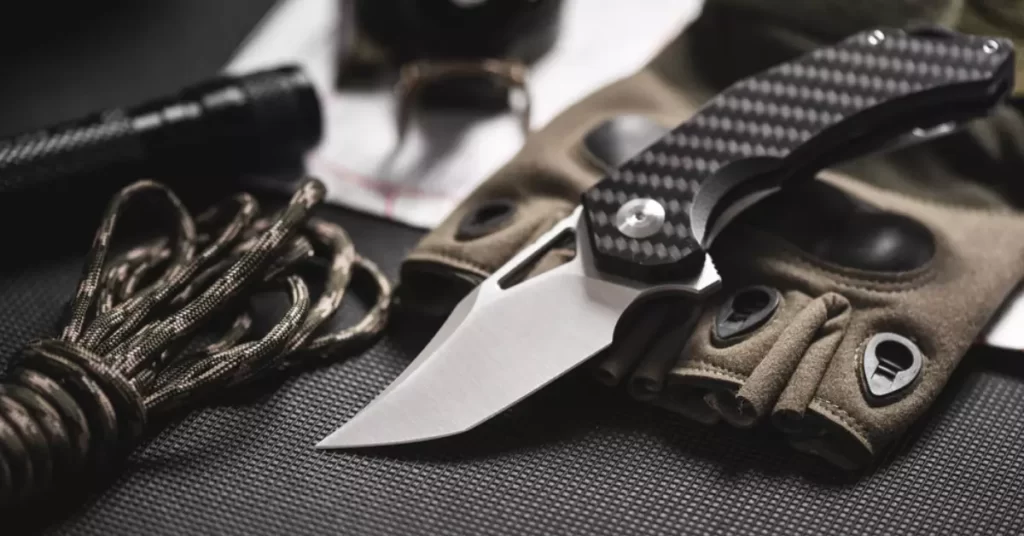There’s no denying the importance of choosing the right steel for a knife. The type of steel determines the blade’s durability, edge retention, and corrosion resistance, among other factors.
One such steel alloy that has gained popularity in knife making is 5160 steel. But what makes 5160 steel stand out, and is it the right choice for your knife?
Let’s dive in and explore the characteristics, benefits, and drawbacks of 5160 steel to help you make an informed decision.
A Brief Overview of 5160 Steel
Composition
5160 steel is a medium-high carbon alloy containing chromium. Its composition includes:
- 0.56-0.64% Carbon
- 0.7-0.9% Chromium
- 0.17-0.35% Manganese
- 0.035% Phosphorus (max)
- 0.04% Sulfur (max)
Properties
The presence of chromium gives 5160 steel excellent toughness and wear resistance, while its medium-high carbon content provides a balance between hardness and ductility.
The steel is known for its ability to withstand high impacts without chipping or breaking, making it suitable for heavy-duty applications.
5160 Steel in Knife Making
Advantages
- Toughness: 5160 steel is extremely tough, making it resistant to chipping and breaking. This makes it ideal for hard-use knives and blades meant for chopping and batoning.
- Edge Retention: The steel holds an edge well, thanks to its carbon and chromium content. This means that you won’t have to sharpen your knife as often.
- Ease of Sharpening: Despite having good edge retention, 5160 steel is relatively easy to sharpen compared to harder, more wear-resistant steels.
- Affordability: 5160 steel is a cost-effective option, offering a good balance of performance and price.
Disadvantages
- Corrosion Resistance: The low chromium content in 5160 steel means it has less corrosion resistance compared to stainless steels. Proper care and maintenance are essential to prevent rusting.
- Not Ideal for Precision Tasks: While 5160 steel is great for heavy-duty applications, it may not be the best choice for knives meant for fine cutting tasks, such as filleting or slicing.

Factors to Consider when Choosing Steel for a Knife
Hardness
Hardness refers to a steel’s ability to resist deformation. Harder steels maintain their edge longer but may be more brittle and prone to chipping.
Toughness
Toughness is a measure of a steel’s ability to absorb energy and resist breaking or chipping. Tougher steels are ideal for applications where the blade may experience high impacts.
Edge Retention
Edge retention refers to a blade’s ability to maintain its sharpness over time. Steels with high edge retention require less frequent sharpening.
Corrosion Resistance
Corrosion resistance is a steel’s ability to withstand rust and other forms of corrosion. Stainless steels generally have higher corrosion resistance than carbon steels.
5160 Mechanical Properties
| Property | Value |
| Hardness (HRC) | 57-62 (after heat treatment) |
| Tensile Strength | 1100-1300 MPa |
| Yield Strength | 900-1000 MPa |
| Elastic Modulus | 190-210 GPa |
| Elongation | 12-16% |
5160 Steel Physical Properties
| Property | Value |
| Density | 7.85 g/cm³ |
| Thermal Expansion | 10.4 µm/m°C |
| Thermal Conductivity | 46.6 W/m·K |
| Specific Heat Capacity | 486 J/kg·K |
Chemical Composition
| Element | Percentage |
| Carbon (C) | 0.56-0.64% |
| Chromium (Cr) | 0.7-0.9% |
| Manganese (Mn) | 0.17-0.35% |
| Phosphorus (P) | 0.035% (max) |
| Sulfur (S) | 0.04% (max) |
Is 5160 Steel Good For Knives?
Yes, 5160 steel is a good choice for knives, particularly those designed for heavy-duty applications. Its toughness, edge retention, and ease of sharpening make it a popular choice among knife makers and users.
However, it may not be the best choice for precision cutting tasks or for those who require high corrosion resistance.
Keep in mind that the performance of a 5160 steel knife is heavily influenced by the heat treatment process. Proper heat treatment can enhance the steel’s hardness, toughness, and edge retention, ensuring a high-performing knife.
When considering a 5160 steel knife, ensure that it has been heat treated by a reputable manufacturer.
Heat Treatment of 5160 Steel
Process
Heat treatment is crucial in enhancing the properties of 5160 steel. The process typically involves:
- Austenitizing: Heating the steel to around 830-870°C (1526-1598°F), then holding it at this temperature for a specific amount of time.
- Quenching: Rapidly cooling the steel in oil or water to lock in its structure.
- Tempering: Reheating the steel to a lower temperature (around 200-500°C / 392-932°F) to improve its toughness and reduce brittleness.
Impact on Knife Performance
Proper heat treatment can significantly improve the performance of a 5160 steel knife. It can enhance hardness, allowing for better edge retention, while also maintaining toughness and reducing the risk of chipping or breaking.
Proper tempering can further improve the balance between hardness and toughness, ensuring a long-lasting and reliable knife.
Comparing 5160 Steel to Other Knife Steels
1095 Steel
1095 steel is a high-carbon steel with a higher carbon content (0.95%) than 5160 steel. It’s known for its excellent edge retention and hardness, but it is more brittle and prone to chipping compared to 5160 steel.
1095 steel is also more susceptible to corrosion, requiring proper care and maintenance to prevent rust.
D2 Steel
D2 steel is a high-carbon, high-chromium tool steel known for its excellent wear resistance and edge retention. However, it is more challenging to sharpen than 5160 steel and has slightly lower toughness.
D2 steel has better corrosion resistance than 5160 steel due to its higher chromium content, but it’s still not as resistant as stainless steels.
A2 Steel
A2 steel is another tool steel with a good balance of toughness, edge retention, and wear resistance. It has better corrosion resistance than 5160 steel but is not as tough.
Sharpening A2 steel is more difficult than sharpening 5160 steel, making it less ideal for users who require easy maintenance.
Applications of 5160 Steel in Knives
Given its characteristics, 5160 steel is well-suited for heavy-duty knives and tools, such as:
- Survival knives
- Bowie knives
- Machetes
- Axes and hatchets
- Choppers
While 5160 steel is excellent for these applications, it may not be the best choice for knives intended for delicate tasks, such as fileting or precision slicing.
Taking Care of Your 5160 Steel Knife
To keep your 5160 steel knife in good condition, follow these tips:
- Clean your knife after each use, especially if it has been exposed to moisture or corrosive substances.
- Dry the blade thoroughly after cleaning to prevent rust.
- Apply a thin coat of oil to the blade to protect it from moisture and corrosion.
- Sharpen the knife as needed using a suitable sharpening tool or method.
- Store the knife in a dry, well-ventilated area away from moisture and humidity.
FAQs
Can 5160 steel be used for kitchen knives?
While 5160 steel can be used for kitchen knives, its corrosion resistance is not ideal for a kitchen environment. Stainless steels are generally better suited for kitchen knives due to their superior corrosion resistance.
How does 5160 steel compare to stainless steel?
5160 steel is a carbon steel with lower corrosion resistance compared to stainless steels. However, it has higher toughness and is more suitable for heavy-duty applications.
Is 5160 steel easy to sharpen?
Yes, 5160 steel is relatively easy to sharpen compared to harder, more wear-resistant steels. This makes it a suitable choice for those who prefer knives that are easy to maintain.
Final Verdict
5160 steel is a good choice for knives designed for heavy-duty applications, thanks to its exceptional toughness, good edge retention, and ease of sharpening.
While it may not be the best choice for precision cutting tasks or corrosion-prone environments, its affordability and performance make it an attractive option for many knife enthusiasts.
Ultimately, the decision to choose a 5160 steel knife depends on your specific needs, preferences, and the intended use of the knife.
